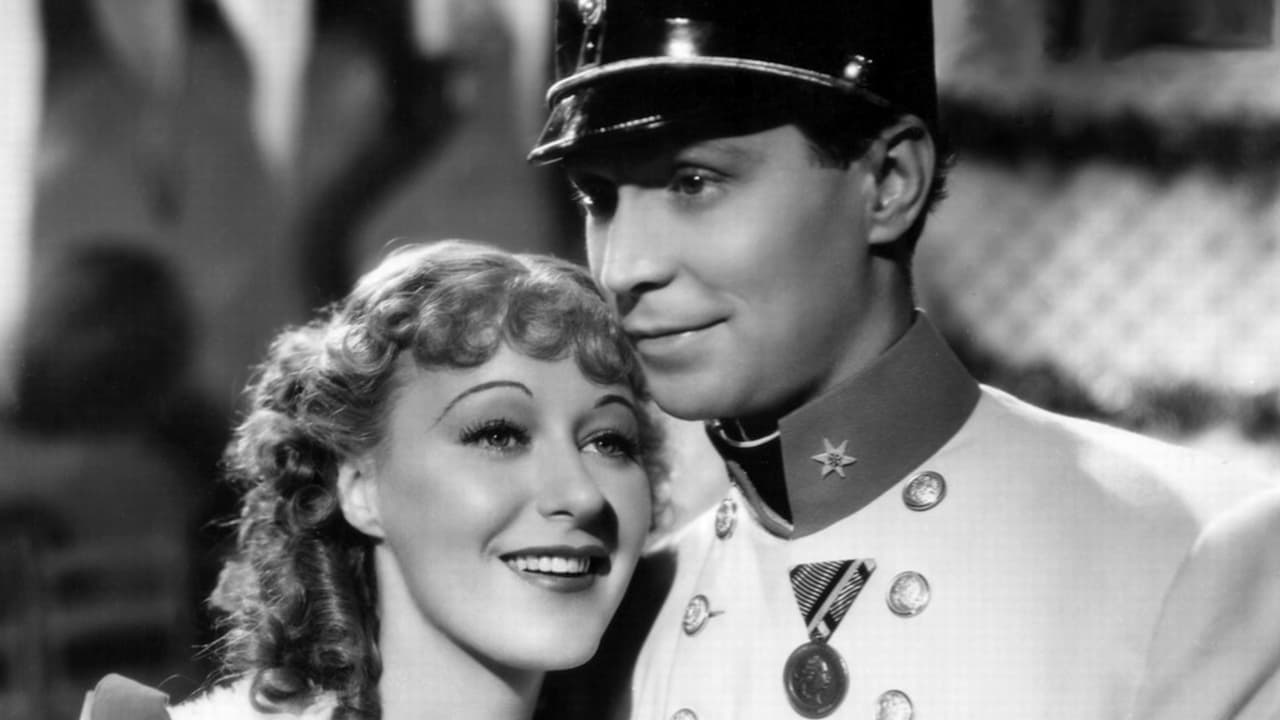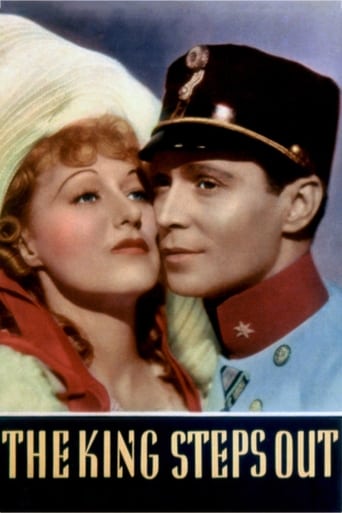Stephan Hammond
It is an exhilarating, distressing, funny and profound film, with one of the more memorable film scores in years,
Sameer Callahan
It really made me laugh, but for some moments I was tearing up because I could relate so much.
Dana
An old-fashioned movie made with new-fashioned finesse.
MartinHafer
During the 19th century, Empress Sisi of the Austria-Hungarian Empire was the darling of Europe. She was pretty and the newspapers turned her into a sensation. In many ways, the hubbub around her was like that of the late Princess Diana Windsor...with people adoring her though not exactly sure why. In real life, Sisi was a strange, vain lady who couldn't live up to this public image...after all, who could?! Well, because of her huge popularity in her time, it's not at all surprising that she was the subject of quite a few films...such as the lavish Sisi series starring Romy Schneider. Like this series, "The King Steps Out" is pretty much fiction...showing a strong romance with her eventual husband, Emperor Franz Josef...though in real life they could barely stand each other and spent much of their married life apart! So, if you see this film, remember that it is NOT really a biography...just an excuse to see the opera star Grace Moore sing!The story purports to be the love story of Franz Josef and Sisi. Originally, the Emperor was going to marry Sisi's sister, but the sister already had a boyfriend. As for Sisi, she and the Emperor meet and fall in love...not knowing who the other was. All in all, both appear to be swell, down to Earth people. Apart from the names, pretty much all the story is fiction.So is it any good? Well, the history teacher within me says no because the film is a historical nightmare. But, on the positive side, while it's a Grace Moore film, she doesn't sing all that much...a major plus for most viewers since most viewers don't want to hear opera music. Overall, pleasant fluff that bears almost no semblance to Sisi or Franz Josef.
TheLittleSongbird
Notable for starring Grace Moore, being directed by Josef Von Sternberg and having tunes by none other than violin virtuoso and composer Fritz Kreisler, 'The King Steps Out' is still an enchanting and very entertaining film in its own right.Its weak point is the story, which is very slight and occasionally veers on the wrong side of absurd. Herman Bing's role is also a little over-exposed, and while Fritz Kreisler's songs are lovely, lushly orchestrated and full of energy and pathos the only ones that really have unforgettable staying power are "Stars in My Eyes" and "What Shall Remain" (there's absolutely nothing wrong with them, they just don't have the wow factor).'The King Steps Out' is a gorgeous-looking film though, with sumptuous period detail and photography that really shimmers. The script is heart-warming, light-footed and smart, with Walter Connolly and especially Herman Bing (did mention about him being over-exposed but still loved the performance) providing some scene-stealing moments, Bing especially delighting by facial expressions, use of voice and body language.Sternberg directs more than competently, personally didn't think any lack of trust in the material came through, and the energy and enchanting charm 'The King Steps Out' exudes in every frame makes it such an easy film to like. Moore proves to be a graceful leading lady, beautiful in voice and a deft comedienne, while Franchet Tone is elegantly charming. Their chemistry is sweet and wholly natural.All in all, slight but enchanting. Moore may be the main attraction, but she is certainly not the only reason to see this. 7/10 Bethany Cox
drednm
Grace Moore stars as a feisty younger daughter of the eccentric Duke of Bavaria (Walter Connolly) whose oldest daughter is off to Vienna to marry the Emperor (Franchot Tone). Moore follows along, masquerading as a dressmaker. The arranged royal marriage when Tone spies Moore and is smitten. The masquerade continues in a merry mix-up until the finale.Moore is good here, light and comic, but the songs are all rather bland. Tone is handsome as the Emperor, and Connolly steals the show as the beer-guzzling duke. Co-stars include the wonderful Herman Bing as proprietor of the inn, Elisabeth Risdon as the Empress, Nana Bryant as the mother, Frieda Inescort as Helena, Victor Jory as Palfi, Eve Southern as the fortune teller, and Johnny Arthur as the inept chief of police. Others include Thurston Hall, Raymond Walburn, Al Shean, E.E. Clive, William Hopper, and George Hassell.Moore had a hit-or-miss 9-film career in the 30s, She flopped badly in her 1930 debut in A LADY'S MORALS but had a big hit and an Oscar nomination for ONE NIGHT OF LOVE in 1934.And yes, Broadway Superstar Gwen Verdon made her film debut here as a ballerina. She was 11 years old.
oOgiandujaOo_and_Eddy_Merckx
I am reminded of the cry of my toddler nephew when witnessing a minor mishap, a plaintive beatific "oh no!", often with his little finger raised aloft; I am reminded of this when examining this film's reputation on the IMDb, and sadly, it appears to have been seen by few people. This is not typical von Sternberg heroin, and I can only think that the few people who have seen it here were expecting such. The soul of the film is much more to do with Ernst Lubitsch. I think it does very well on that level, it's a saucy comedy. One thing that is typical of von Sternberg however, is that the movie has dream absurdity. The clan of Habsburg blue-bloods on display here have more in common with the Munsters than with any sort of historical reality.The film is mostly a farce. The Empress Mother of the Austro-Hungarian Empire decides to marry her son Emperor Franz Josef (played with elegance by Franchot Tone) off to a relative, the princess Helena, who is a pretty little drip, seemingly permanently anaesthetised. Her sister Sissi wishes to save her from this fate and henpecks her curmudgeonly father Maximilian, Duke of Bavaria, out of the door to intercede on Helena's behalf to stop the arranged marriage.You would not guess given the absurdly low rating of this film that it a bona fide rib-tickler. Uncredited Raymond Brown as the innkeeper of The Golden Ox is simply hilarious. Just watch him try to catch his own whistle. One thing that I like to see in a comedy is misplaced hysteria, the innkeeper's hilarious rasping, lisping, and stuttering, when he gets out of control and confused are a glory, similarly the chief of the secret police, who really appears to be afraid of his own shadow, will have you rolling on the floor as he flinches and twitches.Sissi and Franz Josef's lovemaking is the backbone of the movie and is amusing and constantly carefree, and even raunchy (given the times).I enjoyed seeing the corps de ballet in this film, practising in a hall, Sternberg's play of light and dark attempting to give Degas a run for his money in terms of ballet studies. There seemed almost no reason for the scene, but I'm not complaining.This is not one of the great movies, but it is something I specifically chose as Christmas fare par excellence, and I chose well.

